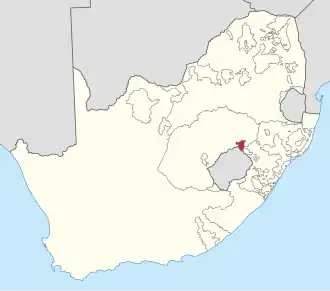QwaQwa
QwaQwa | |||||||||
|---|---|---|---|---|---|---|---|---|---|
| 1974–1994 | |||||||||
.svg.png) Flag
 Coat of arms
| |||||||||
 Location of QwaQwa (red) within South Africa (yellow). | |||||||||
| Status | Bantustan | ||||||||
| Capital | Witsieshoek | ||||||||
| Common languages | Sesotho English Afrikaans | ||||||||
| Chief Minister | |||||||||
| History | |||||||||
• Self-government | 1 November 1974 | ||||||||
• Re-integrated into South Africa | 27 April 1994 | ||||||||
| Area | |||||||||
| 1980[1] | 620 km2 (240 sq mi) | ||||||||
| Population | |||||||||
• 1980[1] | 157,620 | ||||||||
• 1991[2] | 542,886 | ||||||||
| Currency | South African rand | ||||||||
| |||||||||
| Today part of | South Africa | ||||||||
Qwaqwa was a Bantustan ("homeland") in the central eastern part of South Africa. It encompassed a very small region of 655 square kilometres (253 sq mi) in the east of the former South African province of Orange Free State, bordering Lesotho.[3] Its capital was Witsieshoek. It was the designated homeland of more than 180,000 Sesotho-speaking Basotho people.
The frequent snow on the Maloti mountain peaks led the San to call the region "Qwaqwa" (whiter than white).[4] In Afrikaans it was known as "Witsieshoek", after Oetse (also Witsie and Wetsi), a Makholokoe chief who lived there from 1839 to 1856.[5]
Three tribes lived in the region, the Makholokoe, Bakoena and the Batlokoa.[6] In 1969 they were united and the area was named "KwaKwa".[7] In the same year, the name was changed to "QwaQwa."[8]
History
On 1 November 1974, Qwaqwa was granted self-government, with Tsiame Kenneth Mopeli as Chief Minister. Mopeli would serve as Chief Minister throughout QwaQwa's existence.
After 27 April 1994, QwaQwa was dissolved, following the first South African democratic election, and reunited with Orange Free State. It is now part of the Free State province, with Witsieshoek serving as the seat of Maluti a Phofung Local Municipality.
The municipality also comprises the towns of Harrismith and Kestell. Together, they have a combined population of 385 413, of which about 80% lives in the former QwaQwa. The population is divided as follows: 98.09% Black; White 1.68%; Coloured 0.09% and Asian and/or Indian 0.13%.
The place was also a major educational centre in the old apartheid days, with at least 80% of schools in the present Free State province having teachers that were educated in the former homeland. It has a fully functional university, but its teachers' colleges have been turned into FETs (Further Education and Training) colleges. The university was called "Uniqwa" under the University of the North before 1994, but it since has been incorporated into the University of the Free State (UFS) and renamed "UFS Qwaqwa Campus".
The Bantustan of QwaQwa had only one district in 1991, Witsieshoek, with a population of 342,886.[2]
Geography
QwaQwa is situated in the eastern Free State province, nestled at the foothills of the Maluti–Drakensberg escarpment between the towns of Harrismith and Witsieshoek. The former homeland covered roughly 655 km² of high-altitude grasslands (1 600–2 000 m above sea level), dissected by steep mountain valleys and the Elands River catchment.[9]
Education
The region hosts the University of the Free State’s QwaQwa Campus at Phuthaditjhaba. Originally established in 1982 under Dr T.K. Mopeli, it became part of UFS in 2003 and now enrolls approximately 3 800 students across Humanities, Education, Economic & Management Sciences, and Natural & Agricultural Sciences. The campus emphasises rural-development research and community outreach.[10]
Tourism and conservation
In 2005 the former QwaQwa National Park—and its Basotho Cultural Village—was formally incorporated into Golden Gate Highlands National Park.[11] Today the “QwaQwa Rest Camp” offers visitors immersive tours of traditional Basotho homesteads, guided horse-rides and hiking in the iconic golden sandstone cliffs of the Maluti Mountains.[12]
Notable people from QwaQwa
- Seipati Seoke - Lesedi FM Presenter and 2020 DStv Mzansi Viewers' Choice Awards
- Hlaudi Motsoeneng - African Content Movement (ACM) and former acting Chief operating officer of the South African Broadcasting Corporation (SABC)
See also
References
- ^ Sally Frankental; Owen Sichone (2005-01-01). South Africa's Diverse Peoples: A Reference Sourcebook. ABC-CLIO. p. 187. ISBN 978-1-57607-674-3. Retrieved 2013-09-18.
- ^ a b "Census > 1991 > RSA > Variable Description > Person file > District code". Statistics South Africa - Nesstar WebView. Archived from the original on 19 June 2016. Retrieved 18 August 2013.
- ^ https://www.sahistory.org.za/place/quaqua
- ^ https://www.sahistory.org.za/place/phuthaditjhaba-free-state
- ^ Raper, PE. "Dictionary of Southern African Place Names". Human Science Research Council. p. 478. Retrieved 15 February 2016.
- ^ Aerni-Flessner, John; Magaiza, Grey (2023-04-03). "Basotho and the Bantustans: Long-Term Impacts of Historical Borders on Borderlands Communities in QwaQwa and Lesotho". South African Historical Journal. 75 (1–2): 111–129. doi:10.1080/02582473.2024.2336534. ISSN 0258-2473.
- ^ "History of Qwaqwa". News24. Retrieved 2025-08-12.
- ^ "Quaqua | South African History Online". sahistory.org.za. Retrieved 2025-08-12.
- ^ "Qwaqwa Campus". www.ufs.ac.za. Retrieved 2025-08-12.
- ^ "News Archive". www.ufs.ac.za. Retrieved 2025-08-12.
- ^ "Media Release: Golden Gate Highlands National Park – Poised to attract more tourists to the Free State – News". SANParks. Retrieved 2025-08-12.
- ^ "Golden Gate Highlands National Park". SANParks. Retrieved 2025-08-12.